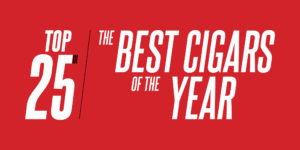You’d be hard pressed to find nicer people in the cigar industry than Emille and Azarías Mustafa, the husband-and-wife team behind Córdoba & Morales Cigars. Earlier this week, they were visiting Miami from their home in Orlando, so I met with them at Mesa’s Cigars to talk about their company, their latest release, and their outlook on the FDA’s expansion of its own regulatory authority.
Nicolás Antonio Jiménez: Tell me about the history of your brand. I think that even a lot of people who have come across your cigars might not have ever heard much about how you got started.
Azarías Mustafá: I got started in Orlando, actually, doing a two-cigar pack. It had a Connecticut and a maduro.
NAJ: What were they called?
AM: Front 9 and 19th Hole. People started to like the cigars. I started giving them to friends when I would go to shops. They’d say it was good and that I should come out with a box of 20 or so. That’s how the brand got started. I’m not following anyone, but my grandmother did used to have a farm in Pinar del Río where all she did was grow tobacco. Her name was Celestina Córdoba Morales, so I named the company after her. This will be our fifth year.
After Front 9 and 19th Hole, I did an Habano and called it Family Reserve.
NAJ: Where have the biggest jumps in the company’s growth been?
AM: I did a cigar three years ago called Clave Cubana, which had a red band and a red box. It was on the more expensive side, but it did really well. That was when I figured out, you know, if you have something good and people like it, you have a niche to sell a few boxes. Good cigars can make you good money. People ask me to make more; I could, but it wouldn’t be with the same wrapper, so I choose not to compromise or lie about it. It’s a thousand boxes a year and that’s it. Then Clave Cubana Etiqueta Blanca (Spanish for White Label) did well, too.
Last year, we really killed it with our Platino line, but it was kind of a messy brand. I started making them in the U.S., in Tampa. A childhood friend had come from Cuba and he’s a great roller, so we started making some cigars in Tampa. We made too many different cigars with just one label, so there was an Habano and a Sumatra — several different variations — all with the same “Platino” band. I realized I was confusing people, but they’re still selling. That branding could use some help, but I still get orders all the time. People call and say, “I want that Platino … I don’t even know which one it is!”

NAJ: Before this, you were a golf pro and Emille was a massage therapist. In both cases it was kind of a big transition into the cigar business. Where has the steepest learning curve been?
AM: On the cigar side, you might think you know a little bit about tobacco — nobody really knows everything — but sometimes you make something you think people will love and it doesn’t sell. Other times you make something that you’re not crazy about and it sells well. So that kind of thing is hard.
There’s also big competition out there and marketing is no joke. I’ve never been able to afford advertising. I was actually hoping that this would be the year we could invest in advertising, but I’m kind of scared now with this thing from the FDA. I put everything I have into this. I don’t have another job. Emille doesn’t have another job. People say, “Get ready for golf again!”
Honestly, though, this was going to be the year, even if the advertising happened after the show. I spent a little more money on my booth at the IPCPR trade show this year. I had Dave Payne helping me with PR. We had so many things planned. Let’s see what happens. I’m not totally negative yet.
NAJ: You’ve got to prepare for the worst and hope for the best. Where are the cigars made?
AM: Mostly, they’re made at the American Caribbean Cigars. The only things that are not made there are my little experiments in Tampa with my friend, who was a master roller in Cuba. It’s really hard to work there though, because he can only do so much. For example, with Platino, people really liked it and he couldn’t make enough. I want to start to make everything at American Caribbean.
NAJ: We’ll revisit the FDA, but first let’s talk about your new cigar, Finca Santa Fe. What’s in the blend and what was it that led you to bring this kind of cigar into your portfolio?
AM: I think the number one thing is that I had a lot of great cigars from all over the world, but I never had any cigar that could compare to the Cuban aroma. Some people might criticize me for it, but I love Cuban cigars. And when I say Cubans, I’m not talking about what they’re making right now. We actually went to visit Cuba in February. It was the first time I had been back in 20 years. And I went to La Corona Factory and they didn’t have a leaf in there older than seven months. How can you make good cigars if most of the tobacco you have is practically green, you know? But I went to my uncle’s farm and he made me a cigar where all the tobacco was from one little piece of land. It tasted amazing. The philosophy behind this brand is that we want to have something really unique, really well made, with a firm draw, and that lasts for a long time.
“I went to my uncle’s farm (in Cuba) and he made me a cigar where all the tobacco was from one little piece of land. It tasted amazing.”
We did an event in Orlando at a store called Cigarz on the Avenue to launch it and sold 35 boxes in one little store. The owner was really impressed because so many of his customers came back saying how much they’d loved the cigar.

NAJ: Where did the name Finca Santa Fe come from?
AM: That was the name of the farm where my grandmother was born in San Luís, Pinar del Rió.
NAJ: How long did she grow tobacco on that farm?
AM: From the ‘20s to the early ‘60s. Then she kind of got older and one of her sons stayed there working the farm. She moved closer to the city and died there in 1989.
She was like the man of the house. It’s funny, but in that area there were not a lot of ladies running little farms. She had 16 kids — eight boys and eight girls — and she always had a cigar in her hand.
I know people in Cuba exaggerate their stories a lot, but there is one about her being pregnant and having to have a baby while she was on her way home. She stopped to see the midwife before she got home, had the baby, and said, “Is the baby OK? I have to get back to work.” Crazy.
NAJ: How many of these cigars do you plan to make?
AM: We’ll only be making 9,000 to 10,000 a year. I probably will only put it in our best 30 or 40 stores. And I don’t think I will be able to expand this line too much from there because, the way things are going, those stores will move these cigars quickly. I just gave it to one new store two days ago and he already placed a new order.
NAJ: Shifting gears, since you brought up the FDA thing earlier … We talked about preparing for the worst and hoping for the best. What preparing for the worst look like for you?
AM: We talk about saving every penny in case the (cost of FDA approval for new brands) is not so crazy. If it’s a really crazy number… It doesn’t even have to be that crazy. If it’s $20,000, I don’t think I can do it. But if it’s $5,000, I can try to work with it. But it’s all up in the air. Nobody knows. Everybody’s speculating. I don’t know what to say, man.
NAJ: What are some of the things that you hear from smokers and tobacconists?
Emille Mustafa: I’m surprised at how few consumers are even aware of what’s going on. It’s evident from the number of people who have signed the petition. It’s at 5,600 from what I saw today. And what we need is 100,000. I asked a customer at a store that I work at recently, “Did you hear about the FDA?” And the response was, “No. What’s going on?”
You know, so I’ve been educating them, having them sign (the petition) on my iPad.
“I’m surprised at how few consumers are even aware of what’s going on (with FDA regulation).”
AM: You know what scares me? I think everybody thinks this is going to go away. Everyone I talk to says, “There’s no way they can do that.” They’re doing it!
NAJ: In the best-case scenario — where we somehow end up out of the woods with the FDA — what are your plans for growth? What’s your vision for Córdoba & Morales?
AM: Since we started, each year we have doubled the previous year’s sales. So this year I was thinking if I could only do a little more than last year, I would be really happy. And like I said, we were looking into advertisement. In my mind, it’s time for it already.
NAJ: Anything else you’d want readers to take away from this Q&A?
EM: Again, that they need to sign the petition!
Note: The petition referenced and linked to above has until June 10, 2016 to reach 100,000 signatures. Sign it here.




